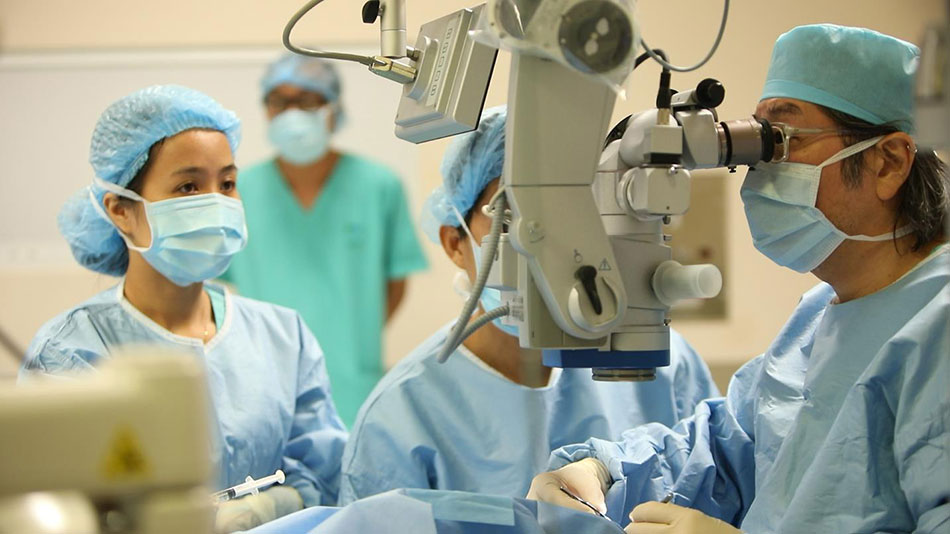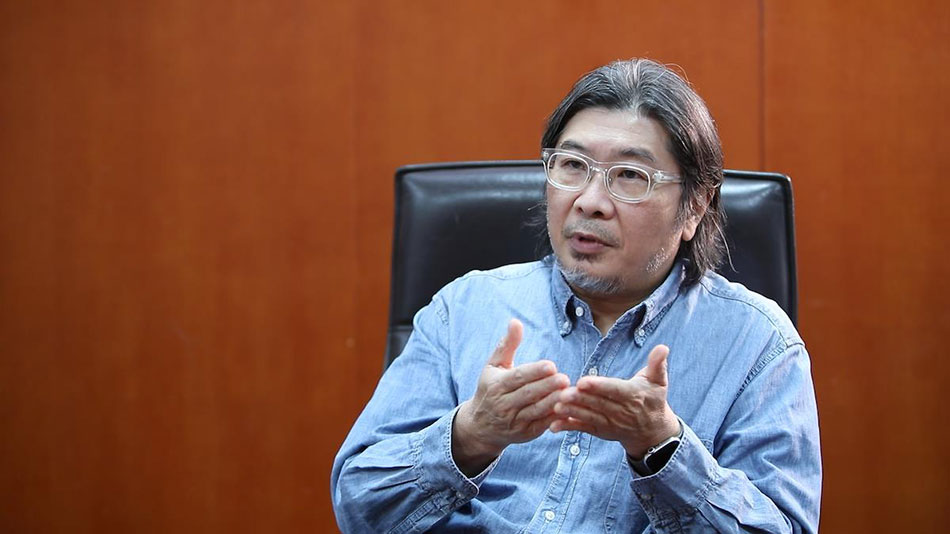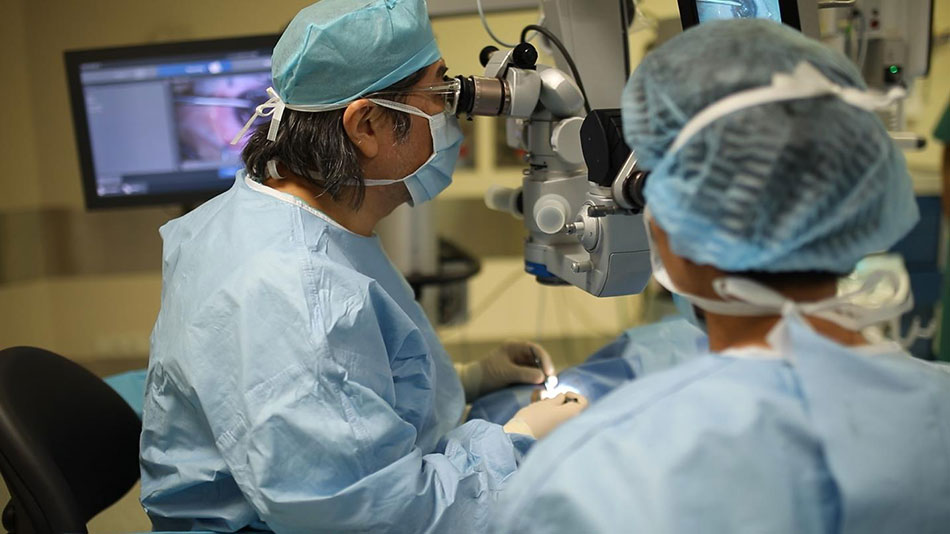Dr Donald Tan, the former President of the World Corneal Society, visited FV Hospital from Singapore to directly examine and provide corneal transplant surgeries at the Ophthalmology Department from May 25 to May 29, 2022.

Prof.Donald Tan (right) performs a corneal transplant at FV Hospital
Overwhelmed with happiness: my eyesight was saved after a long wait
All corneas implanted by Prof. Donald Tan at FV were imported from the corneal bank in the US, recognised as the world’s leading centre for preserving donated corneas. Patients was operated on by Prof. Tan, the world’s leading corneal transplant expert, here in Vietnam, ensuring they benefitted from the best possible outcome at a much lower cost than travelling overseas for treatment, in many cases saving billions of dong. By participating in this programme, patients also do not need to wait for a donor cornea, which are very rare in Vietnam.
During this working trip, Prof. Tan examined nearly 100 cases of corneal diseases, including corneal ulcers, corneal dystrophy, corneal cones or corneal scarring caused by corneal ulcers, corneal damage and complete vision loss. However, because the number of corneas that can be imported is limited, Prof. Donald Tan was only able to perform corneal transplants in seven cases which required urgent corneal transplant at FV Hospital. More patients needing corneal transplants will be scheduled to see Prof. Tan during his upcoming visits at FV Hospital.
Many patients and their relatives burst into tears after a successful corneal surgery restored the patient’s vision emotions compounded by long wait times due to the fact that Prof. Tan had been unable to visit Vietnam due to pandemic-related travel restrictions.
D.H.T. (14 years old, from Dak Lak) received corneal transplant surgery on his right eye by Prof. Donald Tan, and his eyesight was restored within a day of surgery. Ms H., T.’s mother, was so happy that she cried when, after many days of waiting, she was finally able to see that her child’s eyes were healthy again. Ms H. said that by the end of 2021, her child was experiencing severe blurred vision in his right eye, which affected his daily activities and ability to study. If the situation didn’t change, T. might have lost vision in his right eye completely. When Ms H. brought her son to the doctor, she learned that Prof. Tan would soon return to FV to operate on patients. Ms. H. was ecstatic that T. was able to undergo a successful surgery to restore his eyesight. “I am so grateful to Prof. Donald Tan and to the person who donated his cornea so that my son could have surgery, even though I will never know who they were. My child was able to see clearly again just 24 hours after surgery,” shared Ms H.
Similarly, Ms D.T.H (from Lam Dong), the mother of patient Q.H, aged 24 years, who was also operated on by Dr Tan, was extremely happy that her son had been given the opportunity to see again. Ms H. said that her son had been near-sighted from a young age, and his degree of myopia had gradually increased until the vision in his left eye was severely blurred at the age of 22. Ms D.T.H took her son to many places for examination. Finally, in May 2022, FV Hospital invited Prof. Tan to perform corneal surgeries and after Ms H. registered Q.H. for examination, he was selected for surgery. “I am very happy that the world’s leading professional in this field was able to save my son’s left eye so he can live and work normally again. My son had to quit his job as a chef because of his blurred vision,” explained Ms H., excitedly. “If a parent finds out that their child has eye problems, they should regularly visit an eyecare centre for check-ups. It’s not only a case of changing glasses—there are extremely dangerous underlying diseases of the cornea that we don’t know about. Early diagnosis ensures a greater chance of successful treatment.”
Creating conditions for Vietnamese patients to have access to advanced treatment techniques at an economical cost
After a few days of visiting and operating on FV patients, Prof. Donald Tan shared: “This time I saw some very difficult cases due to their condition being prolonged, mostly due to social distancing during the pandemic. I do my best to save the eyesight of as many patients as possible during each of my visits. I’m very happy to help these people to regain their eyesight after a long wait.”

Prof. Donald Tan at FV Hospital
Speaking to how to solve the situation of scarce corneal resources in Vietnam while demand remains extremely high, Prof. Tan comments that the amount of donated corneas in the world is not lacking, but there is a shortage of well-preserved corneas that can be transported from oversees. “In the coming time, we will try to bring new techniques to Vietnam so that we can treat some diseases of the cornea without having to depend on replacement corneal sources.”
Dr Nguyen Thi Mai, Head of the Ophthalmology Department, FV Hospital, shared: “In Vietnam, donated corneas are very rare and there are also few doctors who perform corneal transplants, despite the huge domestic need for this type of surgery. Many patients have to go to Singapore or the U.S. for high-cost treatment, sometimes numbering in the billions of Vietnam dong. When leading international experts visit Vietnam to offer surgeries, this help to reduce the financial burden and stress of travel on patients.” In addition, Dr Mai says that through effective international cooperation programmes between FV and leading experts such as Prof. Tan, Vietnamese doctors will have more opportunities to practice high-tech corneal surgeries here in Vietnam, helping people to feel confident when seeking treatment domestically.
Dr Mai emphasised that the reason Prof.Tan has chosen to perform corneal transplant surgery at FV since 2016 is because our hospital meets international standards for patient safety, including criteria for infection control, and operating room management and postoperative care procedures. This helps to ensure quality for corneal transplant surgeries, allowing doctors to restore patients’ vision, ably assisted by FV’s well-trained operating room crew. Recently, FV achieved JCI international quality certification for the third time in a row with an almost perfect score, receiving high praise from the JCI expert team.
“Inviting leading experts to treat patients here is one of our key commitments under FV’s mission to provide people in Vietnam with world-class care. By offering patients another option to going abroad for treatment by bringing the world’s top experts to FV, patients will enjoy the highest standards of quality care with the least effort and cost, so that they can quickly improve their quality of life,” shared Dr Jean-Marcel Guillon, CEO of FV Hospital.
As the Covid-19 epidemic starts to wane, travel regulations between countries have almost returned to normal and international experts collaborating with FV, including Prof. Donald Tan, Dr Stéphane Guero, Dr Nikolle Tan and Dr Mahen Nadarajah, will continue to visit FV to treat patients in need in the near future. To make an appointment with these doctors, please call FV Hospital at (028) 5411 3333.

Prof. Donald Tan will often return to Vietnam in the near future
More information about Prof. Donald Tan
Prof. Tan has dedicated more than 25 years to treating patients via surgery and implants, as well as research and training, and is ranked in the top 20 of the 100 best eye surgeons in the world. Prof. Tan is also ranked third among the 100 most influential contributors to modern ophthalmology in the world by British magazine The Ophthalmologist.
Prof. Tan applies techniques that require mastery and experience, such as stem cell transplantation to treat diseases on the surface of the eye; the method of “tooth-in-eye”, which helps to restore vision for people with severe corneal damage; corneal resurfacing; artificial corneal transplant; and corneal endothelial transplantation.
Particularly, the partial corneal transplant method, where only the damaged corneal layers are replaced and healthy layers retained, helps to reduce complications and yields better outcomes than conventional transplants, which require replacing the entire cornea. A partial corneal transplant has a 98 per cent success rate and just one per cent rejection rate, while a total corneal transplant has a rejection rate of 10 to 15 per cent and high risk of complications.



